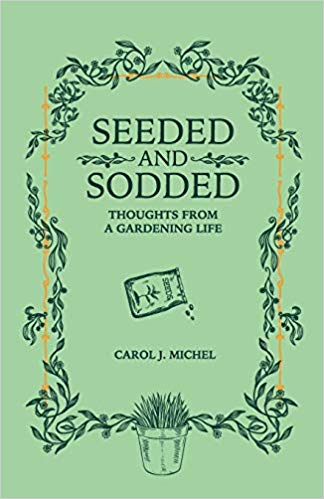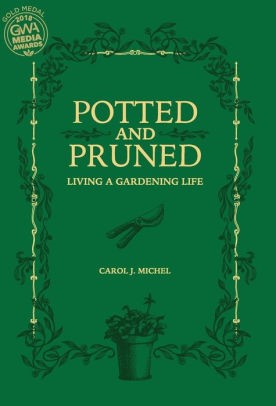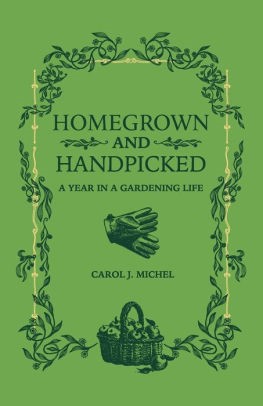Essays on Gardening Life
By George Graine, Fairfax Master Gardener
“The greatest thief this world has ever produced is procrastination, and he is still at large.”
—Josh Billings (pseudonym of Henry Wheeler Shaw) (1818-1865)
 In a new book of only 114 pages, Carol J. Michel wrote 36 essays, many just two pages each but they do pack a punch. Her book is called “Seeded and Sodded: Thoughts from a Gardening Life” (Gardenangelist Books, 2019). Do you know the answer posed by the last essay “Is Gardening Worth It?” Most likely you will agree with the author because “Gardening is worth the sweat. It’s worth the aches. It’s worth the weeds. It’s worth a few insect bites. It’s worth the time to water, to plant, to harvest. Gardening is worth it all.” This is a laugh out loud funny book and at the same time provides many instructional points for you to consider. Several selected examples of essays are noted below.
In a new book of only 114 pages, Carol J. Michel wrote 36 essays, many just two pages each but they do pack a punch. Her book is called “Seeded and Sodded: Thoughts from a Gardening Life” (Gardenangelist Books, 2019). Do you know the answer posed by the last essay “Is Gardening Worth It?” Most likely you will agree with the author because “Gardening is worth the sweat. It’s worth the aches. It’s worth the weeds. It’s worth a few insect bites. It’s worth the time to water, to plant, to harvest. Gardening is worth it all.” This is a laugh out loud funny book and at the same time provides many instructional points for you to consider. Several selected examples of essays are noted below.
First of all, do not become conflicted over the book title because it provides many honest and memorable thoughts, mostly presented in a sound bite way. For sure, this book is not a how-to-do-it chapter by chapter text. You can skip around because each essay is a stand-alone read. You may conjure up some of your own fond memories and perhaps some that are just so-so. More than likely, many of the essays will bring smiles and perhaps a few frowns. The title of some essays can be a head scratcher but that is all part of this fun read. For example, what is Hortotropism? You will not find this word in Webster’s or any other source book because this is a made-up word. Defined as a noun –The natural attraction between two people once they both realize they are gardeners. Used in a sentence — It was hortotropism that caused her to speak to the stranger planting petunias by the sidewalk. Another made-up word — Hortombobulated. This is an adjective meaning: To be thrown into a state of confusion on matters related to gardening. When used in a sentence: Early in the spring, she was hortombobulated, and they found her wandering in her garden wondering what to do first.
Another essay deals with what could be called the three H’s. These are humor, humility and humbleness. For good measure, we can add a fourth H for humus. As the author writes, “You are on your way to making your garden a HUMONGOUS success.” You can only imagine how each essay will help you in the garden. Here are a few more examples. Weeds, the bane of all gardeners gets the Michel treatment. “We slay them, they are weeds, and they must die!” Can you contrast that with plants that are accidently killed? The essay on “Gardening with a GPS” might bring back some frowns regarding your own car GPS memories, i.e., misadventures. After that bit of Imagineering, the author introduces us to an interesting group of characters or, if you will, many of her garden friends and companions including Gloriosa Vanderhort, Ms. Hortefeller, Ms. Hortwad, Dr. Hortfreud, Dr. Hortenstein, HortGreenhouse, F. Lee Hortley, Hortcule Poirot, Hortlock Holmes and Deputy Sheriff Horty Fife. “Does it end there? Maybe, for now. The great Hortocrates, a philosopher of gardening, thinks it should.” Find out how each character helps the author. Use your imagination for each character that could help you in your garden.
Surely it takes GUTS, that is to Garden Under Tough Situations, such as red clay soil, hail or unforgiving thunderstorms that form unwanted furrows. Or how about ornamental grass seed heads (inflorescence) that may infiltrate your picture perfect lawn and garden beds. Good grief! You might wonder how your plants and veggies will survive and thrive under such arduous conditions.
An interesting point to ponder is in the essay on “Garden Excellence or Garden Success?” Here the difference is explained by Dale Carnegie when he wrote, “Success bases our worth on a comparison with others. Excellence gauges our value by measuring us against our own potential. Success grants its rewards to the few but is the dream of the multitudes. Excellence is available to all living things but is accepted by the few.” The book author then provides several examples by citing what is your potential and ends with, “…thank goodness there is enough space in the garden of life for everyone to be excellent.”
Many of you will be able to relate to the essay “The Perfect Plant Deserves a Waltz.” This piece puts into perspective your trip to the garden center. You become distracted from your purpose and instead you buy a plant and now comes the OMG moment — where to plant it? That’s the dance around the garden. How many of us have been there, done that?
After you finish reading this book, give yourself a new title in addition to Mom or Dad. Now you are the CGO or Chief Gardening Officer because this book is all about you and your own garden.
In summary, ban procrastination in your garden. You will not have any regrets. This should be your new reality.
Other books by Carol J. Michel you may be interested in reading:
Homegrown and Handpicked
Potted and Pruned
 |
 |